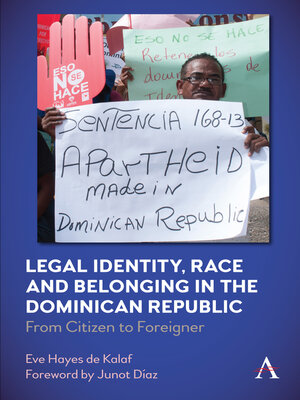Legal Identity, Race and Belonging in the Dominican Republic
ebook ∣ From Citizen to Foreigner · Anthem Series in Citizenship and National Identities
By Eve Hayes de Kalaf

Sign up to save your library
With an OverDrive account, you can save your favorite libraries for at-a-glance information about availability. Find out more about OverDrive accounts.
Find this title in Libby, the library reading app by OverDrive.



Search for a digital library with this title
Title found at these libraries:
| Loading... |
This book offers a critical perspective into social policy architectures primarily in relation to questions of race, national identity and belonging in the Americas. It is the first to identify a connection between the role of international actors in promoting the universal provision of legal identity in the Dominican Republic with arbitrary measures to restrict access to citizenship paperwork from populations of (largely, but not exclusively) Haitian descent. The book highlights the current gap in global policy that overlooks the possible alienating effects of social inclusion measures promulgated by international organisations, particularly in countries that discriminate against migrant-descended populations. It also supports concerns regarding the dangers of identity management, noting that as administrative systems improve, new insecurities and uncertainties can develop. Crucially, the book provides a cautionary tale over the rapid expansion of identification practices, offering a timely critique of global policy measures which aim to provide all people everywhere with a legal identity in the run-up to the 2030 UN Sustainable Development Goals (SDGs).
|Over the next decade, states will be carrying out large-scale registrations in alignment with the Sustainable Development Goals (SDGs) which aim to provide more than one billion people around the world with evidentiary proof of their legal and, increasingly, digital existence. 'Legal Identity, Race and Belonging: From Citizen to Foreigner' is an important book which identifies a connection between the role of international actors, such as the World Bank and the United Nations, in promulgating the universal provision of legal identity and links these with arbitrary measures to restrict access to citizenship paperwork from (largely) Haitian-descended people born and living in the Dominican Republic. The book provides the definitive analysis of the events leading up to the controversial 2013 Constitutional Tribunal ruling that rendered the Dominican plaintiff Juliana Deguis Pierre stateless. Hayes de Kalaf illustrates how measures that purposely blocked people of Haitian ancestry from accessing their legal identity not only affected undocumented and stateless populations – persons living at the fringes of citizenship – but also had a major impact on documented people; Dominicans already in possession of a state-issued birth certificate, national identity card and/or passport. The book illustrates the complex and contradictory ways in which digital identity systems are experienced, thus challenging the assumption within current development policy that the provision of ID to everyone, everywhere will lead to the inclusion of all citizens.






